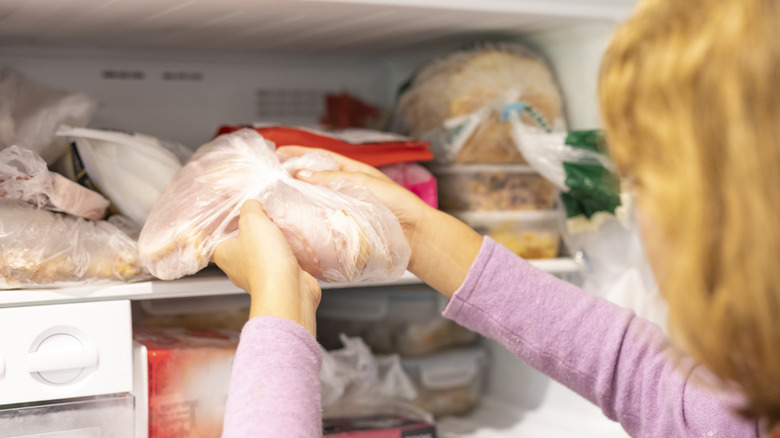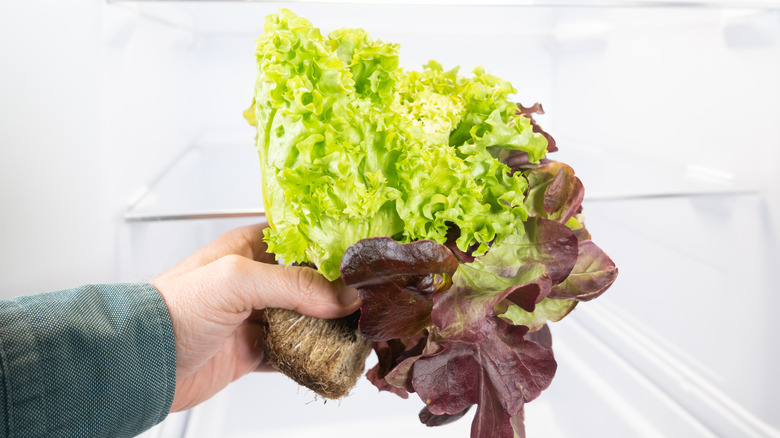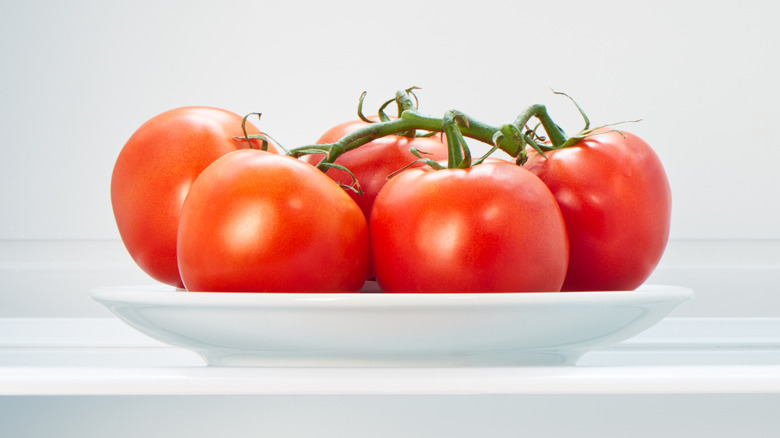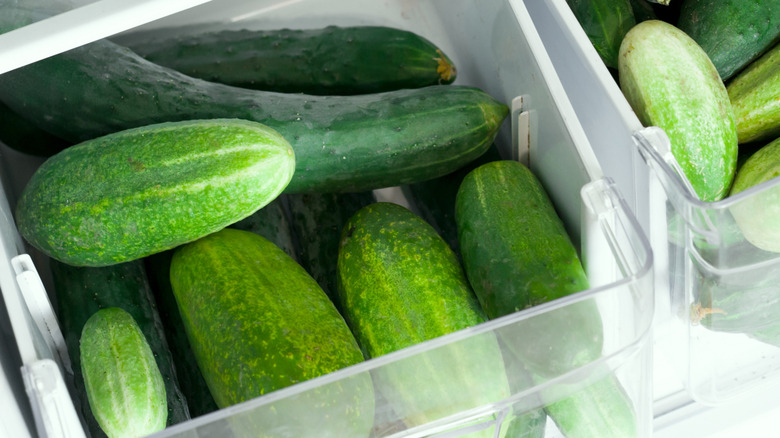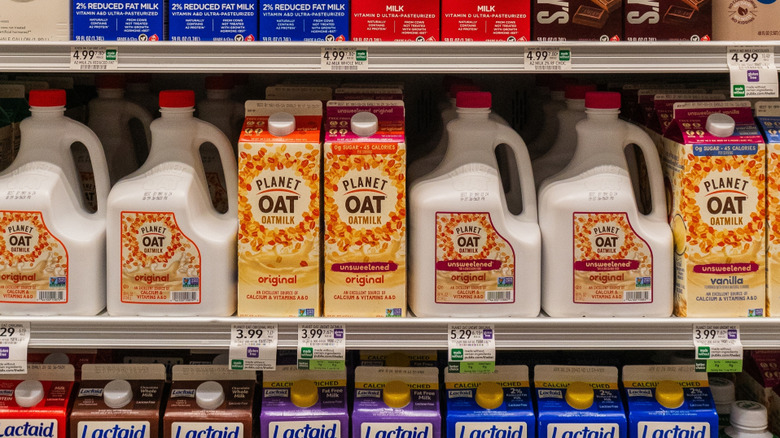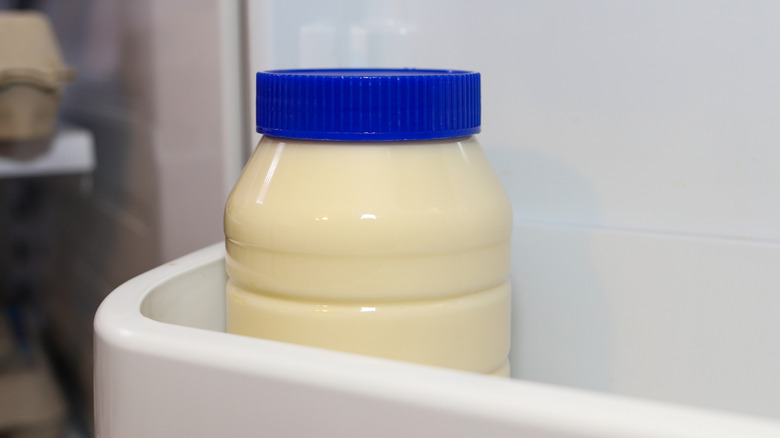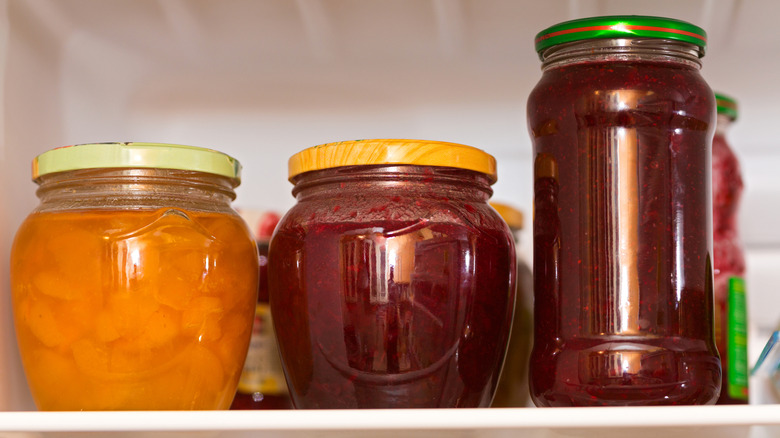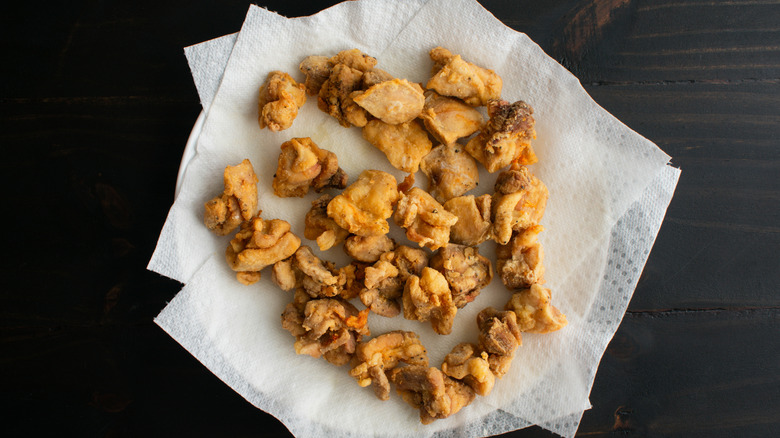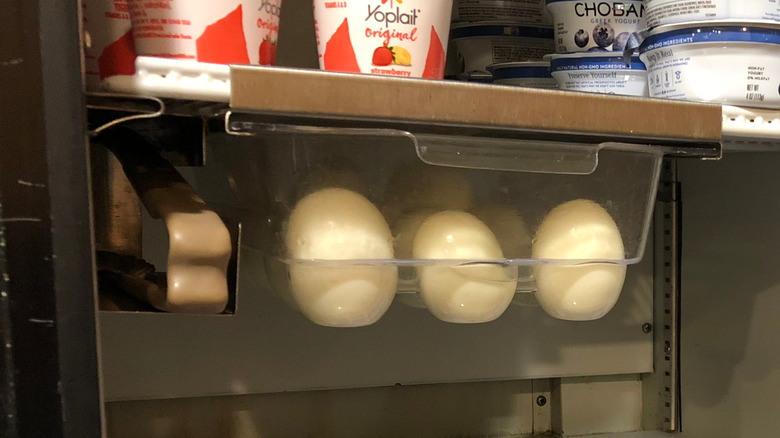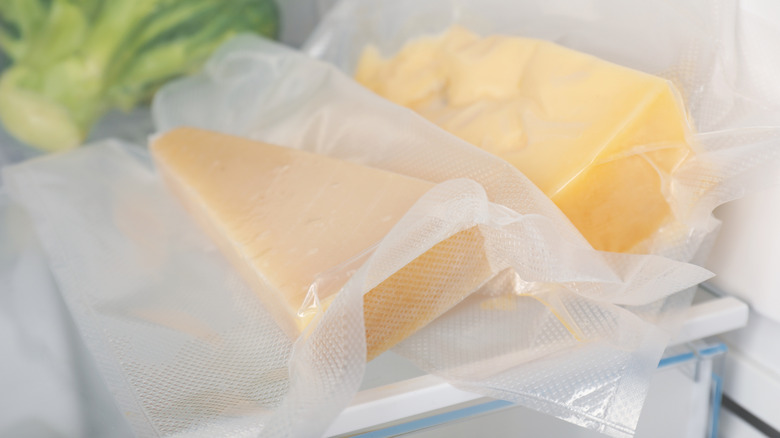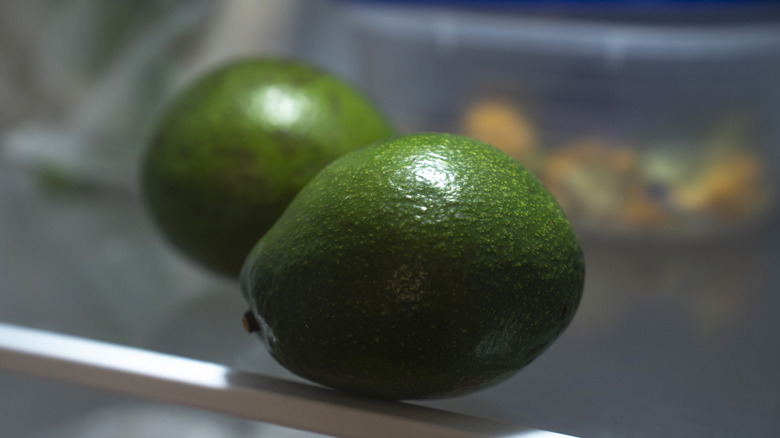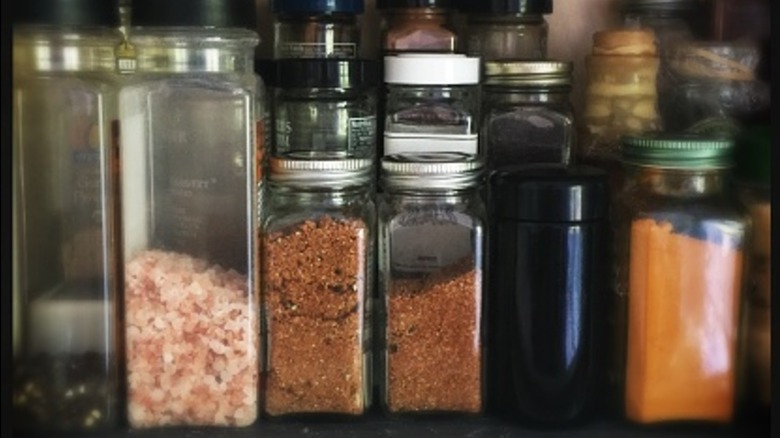14 Foods You Should Never Freeze
The freezer is a magical thing, isn't it? When it comes to preserving your leftover dinner or loaves of bread, using your freezer can help to save time, space, and money. Still, in the frozen food fails category, there are certain ingredients that take the cake (and ruin it), and if you are anything like us, you can probably already think of a few. But if you can't, no worries; we're here to help you.
In this post, we're breaking down the foods you should never freeze — unless you're okay with thawing them into something unrecognizable from their former glory. We'll be focusing on taste, texture, and consistency, so you can know which foods will come out looking differently and why if you choose to freeze them. In addition to which foods you shouldn't freeze and why, we'll also do our best to provide you with the most common and effective ways to store each food item to give it the best chance at longevity. So, let's break the ice and reveal the 14 foods you should never freeze.
Lettuce
Lettuce, especially tender varieties like green leaf, red leaf, romaine, and iceberg, aren't great candidates for freezing. Freezing lettuce damages the cell walls as ice forms. Once thawed, lettuce leaves will weep and lose their crisp charm.
Instead of attempting to freeze lettuce leaves, it might be better to simply place them in the fridge. But the way you go about doing so is crucial if you want to keep your lettuce looking and tasting as fresh as possible. Consider placing your salad leaves in a spinner to remove excess water before putting it in the fridge, along with damp paper towels on top. Don't forget to place a paper towel-lined plate under it, as this will catch any additional water drippings from getting all over your fridge. And though we'd recommend using a versatile salad spinner for both cleaning and drying greens, if you don't have one, you can still use a colander to store your lettuce and possibly get it to last up to 10 days (or more) that way.
Tomatoes
Freezing tomatoes might seem like a good idea if you find yourself with a surplus, but due to their high water content, you shouldn't expect tomatoes to look quite the same upon thawing. Tomatoes will become soft, mushy, and will lack firmness after spending time in the freezer, rendering them useless for delicious salad recipes like this Som Tum-inspired cabbage salad or any other entree that would require fresh tomatoes.
Instead of trying to freeze tomatoes, it might be better to store tomatoes at room temperature. When doing so, keep them in a wine cellar at a temperature between 55-70 degrees Fahrenheit. This will keep your tomatoes tasting fresh without dulling the flavor. If you can't keep them in a climate that specific, try throwing them in the fridge for up to three days, allowing them to come to room temperature before enjoying. You can even place your tomatoes in a cool shaded spot in your kitchen if need be — just note that tomatoes don't respond well to extreme cold or heat, meaning you'll need to be choosy about where you place them if you want them to stay fresh for as long as possible.
Cucumbers
Yes, cucumbers are considered a fruit, and no, they aren't great candidates for freezing. Like tomatoes, cucumbers have high water content and can become mushy after freezing. And since we can't think of many recipes that will benefit from mushy cucumbers, our best recommendation is to skip the freeze and go for refrigeration instead.
When storing whole cucumbers, first wrap them in dry paper towels and place them in a zip-close bag on the refrigerator shelf. You can store cucumbers for over a week (if not two weeks), provided that they aren't sliced. Looking to store cucumber slices? In that case, drop your slices in water in an airtight container or wrap them in damp paper towels before placing them in a zip-close bag. The water helps each cucumber slice retain moisture, therefore keeping them in optimal shape for use in a summery two-ingredient cucumber snack or this TikTok famous easy cucumber salad.
Some dairy-free milk options
Though it is possible to freeze cow's milk, we don't recommend doing the same when it comes to dairy-free plant-based milk options. Like cow's milk, most plant-based milk options (think almond milk, soy milk, and oat milk) will separate after freezing, but a few will also turn grainy after undergoing the thawing process. Expect both almond milk and oat milk to take on a grittier texture once defrosted — other dairy-free milk types may or may not become grainy, depending on the type and brand. You'll also want to ensure that you forgo freezing any milk options in a can. Since the liquid can expand during the freezing process, you risk a freezer explosion you surely won't want to clean up.
If you have almond milk or oat milk you want to hang on to, we suggest paying attention to the expiration or "best buy" date on the container for the best results. Focus especially on any additional notes on the carton. Though the plant-based milk may not technically expire until the date stamped on the outside, the fine print may indicate that your milk is best consumed within a certain time frame (such as seven to 10 days after opening). Remember that homemade versions of these plant-based milk options will also impact the time you can hold on to it: homemade oat milk typically remains good for two to four days in the fridge, while homemade almond milk remains good for about five days.
Mayonnaise
If freezing mayonnaise sounds a bit strange to you, you'd be correct. Freezing mayo isn't a good idea, though some (oddly) think even mayo ice cream sounds delicious. At any rate, once thawed, frozen mayo might become a curdled mess and will no longer be that rich, tangy, and creamy condiment concoction you once loved. And though homemade mayonnaise is indeed satisfying, it will usually do the worst when frozen compared to store-bought varieties.
So, what can be done? If freezing is your only choice, you could consider rescuing frozen mayo by cutting it into cubes and throwing it into a food processor. According to chef and food writer J. Kenji López-Alt, this is a great way to thaw the mayo while somewhat keeping its consistency intact. Otherwise, simply store your mayo in the fridge. Homemade varieties can sometimes last up to two weeks in an airtight container, while refrigerating store-bought options may help it to last up to two months or more. So, think twice before freezing — some foods come back to haunt you, texture and all.
Fruit jelly
This one's a bit controversial, but in general, we wouldn't recommend that you freeze jelly. Since jelly is a thick spread often smeared over bread, you'll want to take caution when using this popular condiment after it has thawed. According to The National Center for Home Food Preservation, freezing jelly and then thawing it could leave you with soggy toast for breakfast. And while there are still some out there who might argue that jelly freezes just fine, we'd say don't risk it, especially if you plan on maintaining its thick jelly-like consistency.
Rather than freezing store-bought jellies and jam, it's better to simply store them in the fridge. A jar of jelly is typically good for up to a year unopened and six months open, assuming that it's kept chilled. And though you will eventually have to go ahead and throw your jelly out once time is up, six months to a year sounds pretty darn good in our book as far as long-term storage goes. Just be sure to watch for spoilage – signs of mold, discoloration, or off-smells are good indicators that the jelly's amiss, and should be thrown out.
Fried food
Thinking about placing fried food in the freezer? Good luck with that. While freezing fried food might seem like a perfectly logical thing to do, the truth is that doing so will cost you, especially if you expect to hold on to its crispy texture. Like with most foods mentioned on this list, ice crystals will change the way your fried food looks and feels once it's thawed. Since the ice crystals are a form of moisture, thawing your fried food will leave it with a coating of water lodged within its skin, causing it to become soggy and thus lose the trademark crisp that makes it so delicious. As if that weren't enough, your food may also undergo a change in flavor. Since certain oils don't always freeze, you may end up with a coating of rancid oil once you go to thaw your fried meal, leading to odd flavors and, not to mention, lots of bacteria to savor.
Instead of freezing your fried foods, allow them to cool completely over a wire rack before transferring to an airtight container lined with paper towels. When putting the food into the container, be sure not to stack — arrange the food in a single layer to prevent sogginess. Afterward, affix the lid and place the container in the refrigerator. No, you won't be able to keep your fried food for months on end this way, but it'll be crispier, tastier, and safer to eat — and who doesn't want that?
Yogurt and sour cream
We had to learn this one the hard way and trust us; it isn't pretty. Freezing both yogurt and sour cream could spell trouble, rendering the texture of either one virtually unrecognizable. Frozen yogurt and sour cream may often look like a curdled mess upon thawing, though the posts over on Reddit insist that a little stirring can get the consistency back to somewhat normal, at least where yogurt is concerned. And while a little mixing may at least help a bit with the texture, it is highly unlikely that your thawed sour cream or yogurt will ever go back to its original thick and smooth texture.
If you want to preserve your yogurt or sour cream in its original state for as long as possible, consider the following tips. The first is to always use a clean spoon when scooping your yogurt or sour cream to avoid introducing foreign bacteria to the mix. The second is to store either dairy product on the refrigerator shelf rather than the refrigerator door, as the fridge door often stays at an unregulated temperature due to its position and frequent opening and closing. Lastly, never return unused yogurt or sour cream back to its container after you've taken it out. As always, keep the lid tightly affixed and watch the expiration dates – if you notice any mold, clumping, or foreign smells, get rid of your yogurt or sour cream immediately.
Jell-O
If you expect Jell-O to keep its jiggly consistency, you might want to skip trying to freeze it. Like so many of the other food items on this list, freezing Jell-O or any other type of gelatin will change its texture. You'll go from bouncy and plump gelatin to a weepy, less structured form of it that will prove a gloopy mess.
Having said that, there are some folks out there who dig frozen gelatin, although it will never be the same once thawed. If you want a crunchy, soft, yet squishy frozen treat, freezing Jell-O might be right up your alley. If, however, your desire is to watch it wiggle and jiggle and use it in all your favorite Jell-O shot or Jell-O salad recipes, then you'll want to pass when it comes to freezing this beloved American treat.
Instead of freezing Jell-O, simply refrigerate it. Most Jell-O should last anywhere between seven to 10 days in the fridge, though you should note that some textural and structural changes may occur during this time. For this reason, consider using up your Jell-O not too long after you've made it.
Hard-boiled eggs
Freezing hard-boiled eggs seems like a noble cause, especially because this is one of the few snacks that are affordable, nutritious, and filling. And while making hard-boiled eggs is one of the easiest things to cook, boiling a batch of them and freezing for later isn't such a bright idea. When hard-boiled eggs are frozen, they often take on a tough texture once thawed. They also usually become watery. This makes them hard to use as an ingredient in egg salad or other dishes where hard-boiled eggs are the star of the show.
As for how long your boiled eggs will last in the fridge? Well, the consensus seems to be that they'll stay good for about one week. Keeping them in their shell is an option, but you could also peel them — just be sure to place them in an airtight container lined with a damp paper towel to ensure that your eggs don't dry out. Whatever you do, remember to keep your boiled eggs chilled since the USDA recommends they be kept at room temperature for no longer than two hours.
Certain types of cheese
If your intention is to use fresh sliced cheese and you want to continue to enjoy its natural texture, you'll want to skip freezing certain kinds of cheese. Store-bought options like cheddar, mozzarella, and provolone often undergo a textural change once frozen and thawed, making them grainy and unpleasant when used in their natural form. Other cheese types, like soft cheese with a natural rind, also won't perform well once frozen and may take on funky and unpleasant flavors.
Instead of freezing, consider storing the cheese blocks in cheese wrap or parchment paper before placing in the refrigerator. You'll also want to make sure that your fridge is clean to prevent any stinky odors or pungent flavors from infusing your cheese while also ensuring that your cheese is placed in a cold area of the fridge or even a crisper drawer to prevent bacterial growth. Vacuum sealing is also a great option, although you'll obviously need to have a vacuum sealer on hand to get the job done.
Whole avocados
Although you may be able to freeze sliced or cubed avocados successfully, freezing them whole won't do the job. Whole avocados can turn icky colors once frozen and thawed, and as such, will no longer resemble the smooth green hue we all associate with a fresh avocado. Not only this, but frozen and thawed avocado also doesn't taste the same nor does it sport the same texture. Instead, you can expect your thawed avocado to be slimy with a sponge-like texture, and the taste? Definitely not the same as a fresh sliced avocado!
So, what's the best way to prolong the life of your avocados? Rather than freeze whole avocados, we recommend you place them in the fridge, preferably in a crisper drawer. This will extend the life of your avocados, albeit only slightly. Once your avocados have ripened, it's best to use them within one to three days to enjoy them at their peak. Whatever you do, please skip the whole "store your avocados in water" trend. Although tempting, trying to preserve avocados this way can lead to the development of bacteria, including salmonella and Listeria monocytogenes, which can cause scary unwanted health issues in exposed persons.
Canned goods and soda
You may already know this, but putting canned goods in the fridge is almost always a bad idea. Ever seen a can bulge from being in the freezer? It happens because cans that contain liquid of any kind will expand and thereby apply pressure to the sides. As the pressure mounts, it causes the can to bulge but doesn't stop there. The can could actually explode, leaving behind a splattered mess and, at worst, someone with an injury.
The same goes for canned soda, though it isn't only the liquid that causes problems here. Carbonation in soda itself is a separate problem. As the water and carbon dioxide within the drink part ways during the freezing process, the water will freeze faster and at a different temperature than the carbon dioxide. This forces all the carbon dioxide into one area, and before you know it, you've got an impending explosion on your hands. Instead, we'd recommend placing your carbonated drinks in the fridge ahead of time or sticking 'em in a cooler full of ice if a refrigerator isn't an option.
Certain spices
If you're anything like us, you probably think freezing spices is already a quirky venture, but there are people who do it, though we think you're better off skipping. Even though we get the premise behind freezing spices, the truth is that doing so alters the flavors of many spice types, and not in a good way. According to the National Center for Home Food Preservation, there are some spices that become more potent, strange tasting, or may even lose flavor altogether. Freezing salt, for example, is said to not only render it void of taste, but also to negatively impact any food item containing fat in terms of spoilage. Additionally, you can expect other spices like paprika to take on new flavors once frozen and pepper, cloves, and some herbs to become more bitter. Want to freeze curry powder? Doing so may cause you trouble, as freezing can lead it to develop musty flavors.
And while we're certain there are some spices out there that probably respond well to freezing, there are many that don't. Take the risk if you want to, but don't say we didn't warn you.
